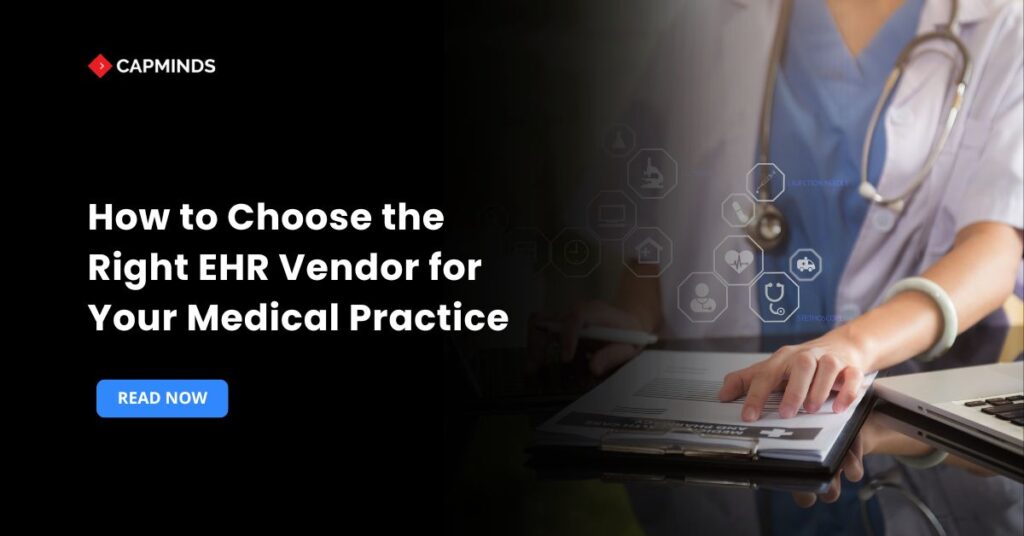How to Choose the Right EHR Vendor for Your Medical Practice
How many practices have spent thousands of dollars on a new technology to realize that it is violently incompatible with their daily routine?
The fact is that ineffective choices in regard to an Electronic Health Record system are one of the most prominent reasons for administrative burden and physician burnout. Any mismatched system may interfere with patient care, affect your revenue cycle, and make your staff frustrated.
The correct EHR vendor selection is a strategic decision, as it may serve as the stimulus that will enhance your clinical productivity, guarantee compliance that is rock-solid, and make your entire practice healthier. Here’s your 2026 step-by-step guide on how to choose the right EHR vendor for your healthcare practice.
What is an EHR Vendor?
An EHR vendor refers to a company that produces, markets, and maintains Electronic Health Record software. This is the computerized support of an up-to-date medical practice, which handles patient medical history, clinical records, invoicing, and appointment bookings.
Choosing an excellent EHR vendor is a long-term decision to go with an EHR implementation partner that will not only offer the software but also the necessary training, technical assistance, and continuous updates in order to ensure a successful transition and to continue using the EHR.
Why Selecting the Appropriate EHR Vendor is Important in 2026
The complexity of today’s medicine, be it value-based care or interoperability demand, implies that no single solution can be suggested as a one-size-fits-all solution anymore. Your EHR is your ticket to compliance and revenue in 2025.
- Financial Health: A specialized platform can minimize claim denials and streamline your revenue cycle management, which has a direct effect on your bottom line.
- Regulatory Compliance: The appropriate healthcare EHR software vendors ensure that their systems will always be in line with the new government and other industry regulations, like HIPAA and MIPS reporting regulations.
- Employee Retention and Satisfaction with Patients: Usability Matters. A convenient system will help clinicians save on the time they would use on data entry and focus more on dealing with their patients, leading to a reduction in burnout.
Steps to Consider While EHR Vendor Selection
1. Practice Needs Assessment
Select Your Selection Team
Build a multicultural team. Add an administrator, a physician champion, a nurse or a medical assistant, and a billing specialist. Every stakeholder poses an essential view on everyday working processes.
Optimize Your Workflows
Map your current practice processes, like check-in of patients to billing and follow-up. Find out what is inefficient, what is a block, and what cannot be changed in your workflow at all. Your EHR vendor checklist is based on this analysis.
Define Must-Have Features
Classify your requirements like must-Have features, such as specialty-specific templates, e-prescribing, high interoperability, and Nice-to-Have like integrated telehealth, advanced AI features.
In the case of EHR systems in small clinics, an all-in-one practice management solution and cloud deployment are among the important considerations to ensure that in-house IT infrastructure expenses are kept to a minimum.
2. Research and Screening Potential Vendors
Prioritize Specialty Fit
Identify medical EHR software providers whose users primarily fall in your area of medical specialty, including cardiology, pediatrics, and mental health. Specialty-specific systems will have pre-built workflows and pre-built content, which will enhance quick implementation.
Check Certification and Interoperability
Making sure that the system is certified by the Office of the National Coordinator of Health Information Technology (ONC). Interoperability that enables easy sharing of data with the local hospitals, laboratories, and registries is not a bargaining point in 2026.
Evaluate Financial and Support Stability
The financial stability of your EHR vendor must support and sustain the product in the long term. Research how much they are dedicated to development and what their model of customer support is, e.g., 24/7. Is it responsive?
3. Order Personalized Demonstrations
There will be a generic demo, and it will display the most beautiful parts of the software. You must have a personal experience to really evaluate a fit.
Use-Case Scenarios
- How a physician records a conventional visit in your specialty.
- The steps to be followed by a billing specialist on a denied claim.
- The way a patient portal request is processed by a nurse.
Test Usability and Customization
Have your end-users try out in their system. One of the main criteria to be listed during EHR selection is the possibility to make simple customizations with the use of EHR, i. e. changing a template or developing a new order set without resorting to calling the vendor of the EHR every time.
4. Finish Your EHR Vendor Checklist and Due Diligence
Discuss with References and Unofficial Clients
Filter the type of client that the vendor recommended by using your professional network to locate new clients of equal size and specialty.
Ask questions on different areas of the system during implementation, support quality after implementation, and assess the success of data migration.
Calculate Total Cost of Ownership (TCO)
Your EHR vendor checklist must include: starting cost, hardware upgrades, data migration cost, training fee, maintenance cost, and potential cost of additional integrated features (i.e., patient portals, reporting tools). Smaller clinics should particularly be keen to detect any latent charges.
Examine the Implementation Plan
An effective EHR implementation partner will deliver an elaborate plan that will involve a data conversion strategy, an effective timeline, and a post-go-live support schedule. Make sure that the contract has specific milestones and Service-Level Agreements.
5. Contract Negotiation and Finalization
Data Ownership and Portability
Make sure that the contract specifies that all patient data belongs to your practice, and the EHR vendor must provide it in a non-proprietary and standard format in the event that you would want to change vendors in the future.
Hidden Fee Disclosure
Be clear about any fee increases, upgrade fees, or fees related to the required regulatory changes that may occur annually.
Implementing a new EHR is a long-term contract, and following this step-by-step approach, your medical practice will be able to find a partner that will not only provide more efficiency and quality care but will also make you successful far beyond 2026.
CapMinds EHR Implementation & Integration Services for Smarter Healthcare Practices
Selecting the right EHR vendor is only the first step; successful implementation, integration, and optimization are what define long-term success. At CapMinds, we go beyond software to deliver a complete ecosystem of EHR services tailored for modern healthcare practices.
Our end-to-end EHR implementation and integration services ensure seamless transitions, interoperability, and performance that matches your clinical and administrative goals.
Our Digital Health Tech Services Include:
- EHR Implementation Services: Simplified implementation based on workflow mapping and data migration assistance.
- EHR Integration Solutions: FHIR, HL7, and API-based lab, billing, and external integration.
- EHR Consultation Services: Specialist advice on the selection, optimization, and readiness of compliance.
- Cloud EHR Solutions: Affordable, scalable, and secure infrastructure for small to large practices.
Partner with CapMinds to build a connected, compliant, and future-ready healthcare ecosystem.




